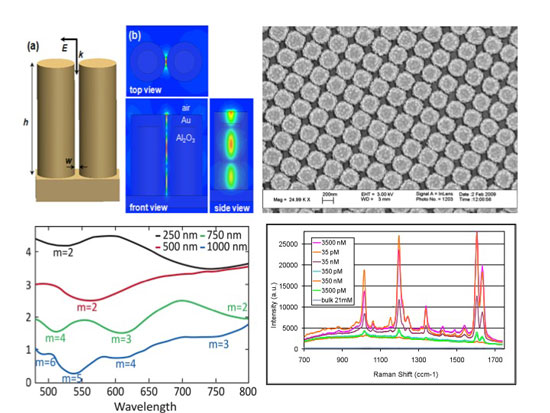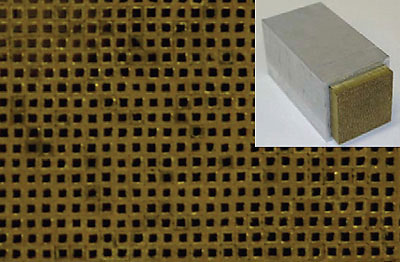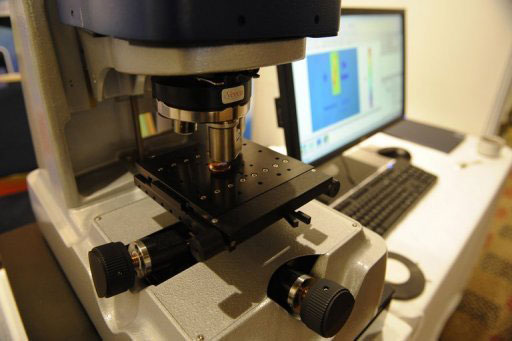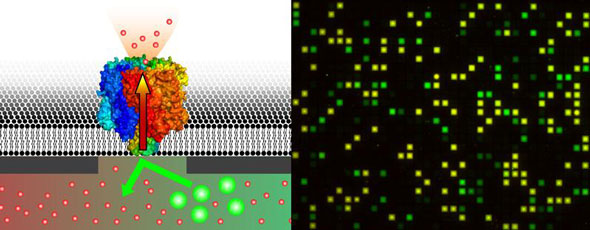The heat radiating off roadways has long been a factor in explaining why city temperatures are often considerably warmer than nearby suburban or rural areas. Now a team of engineering researchers from the University of Rhode Island is examining methods of harvesting that solar energy to melt ice, power streetlights, illuminate signs, heat buildings and potentially use it for many other purposes.
Nov 9th, 2010
Read more
 Laboratory researchers may have found a way to improve Raman spectroscopy as a tool for identifying substances in extremely low concentrations. Potential applications for Raman spectroscopy include medical diagnosis, drug/chemical development, forensics and highly portable detection systems for national security.
Laboratory researchers may have found a way to improve Raman spectroscopy as a tool for identifying substances in extremely low concentrations. Potential applications for Raman spectroscopy include medical diagnosis, drug/chemical development, forensics and highly portable detection systems for national security.
Nov 9th, 2010
Read more
 University of California, Berkeley, scientists have found a way to overcome one of the main limitations of ultrasound imaging - the poor resolution of the picture.
University of California, Berkeley, scientists have found a way to overcome one of the main limitations of ultrasound imaging - the poor resolution of the picture.
Nov 9th, 2010
Read more
At the current pace of research and development, global oil will run out 90 years before replacement technologies are ready, says a new University of California, Davis, study based on stock market expectations.
Nov 9th, 2010
Read more
Ben-Gurion University of the Negev's Prof. Ron Folman has been named as a recipient of the prestigious 2011 Willis E. Lamb Award for Laser Science and Quantum Optics.
Nov 9th, 2010
Read more
Information coded as impulses is transferred from one neuron to its target at synapses. At these close neuron-neuron contacts the impulse opens voltage sensitive calcium channels allowing the influx of calcium ions (Ca2+) and this ion then acts as a 'second messenger' to trigger the release of neurotransmitters by the fusion of a secretory vesicle with the surface membrane. Scientists have now established that the relationship between the calcium channel and the secretory vesicle is very intimate, so much so that the fusion of a secretory vesicle can be triggered by the plume of Ca2+ entering through a very closely situated single calcium channel.
Nov 9th, 2010
Read more
Quantum computers should be much easier to build than previously thought, because they can still work with a large number of faulty or even missing components, according to a study published today.
Nov 9th, 2010
Read more
 A material just one atom thick that is stronger than steel but flexes like rubber. A 'mini-submarine' that can trick the immune system and deliver a payload of chemotherapy deep inside a tumour. They sound like the fantasies of science fiction writers, but they are among the discoveries being presented at Nano Israel 2010, a nanotech conference in Tel Aviv that has attracted researchers from across the science world, united by their work with the very, very small.
A material just one atom thick that is stronger than steel but flexes like rubber. A 'mini-submarine' that can trick the immune system and deliver a payload of chemotherapy deep inside a tumour. They sound like the fantasies of science fiction writers, but they are among the discoveries being presented at Nano Israel 2010, a nanotech conference in Tel Aviv that has attracted researchers from across the science world, united by their work with the very, very small.
Nov 9th, 2010
Read more
A tunable infrared laser system for the selective processing of organic layers in opto-electronical components is the goal of the new research project IMPROV, which started in September, 2010. The EU has provided approximately 2.4 million Euros support from the 7th Framework Programme for the project, which will run until 2013.
Nov 9th, 2010
Read more
 Der Arbeitsgruppe Prof. Robert Tampe an der Goethe-Universitaet ist es in Zusammenarbeit mit dem Walter-Schottky Institut der TU Muenchen gelungen, eine neue Methode zur automatisierbaren und Hochdurchsatz-geeigneten Untersuchung der hochempfindlichen Membranproteine zu entwickeln.
Der Arbeitsgruppe Prof. Robert Tampe an der Goethe-Universitaet ist es in Zusammenarbeit mit dem Walter-Schottky Institut der TU Muenchen gelungen, eine neue Methode zur automatisierbaren und Hochdurchsatz-geeigneten Untersuchung der hochempfindlichen Membranproteine zu entwickeln.
Nov 9th, 2010
Read more
A new report from the inspector general of the U.S. EPA on the lack of sufficient monitoring of water supplies provides more reason for Americans to consider using 'final barrier' technology in their homes, according to the Water Quality Association.
Nov 9th, 2010
Read more
 Oak Ridge National Laboratory researchers Jeremy Busby, De-en Jiang and Sergei Kalinin are among 13 Department of Energy scientists to receive the Presidential Early Career Award for Scientists and Engineers, or PECASE.
Oak Ridge National Laboratory researchers Jeremy Busby, De-en Jiang and Sergei Kalinin are among 13 Department of Energy scientists to receive the Presidential Early Career Award for Scientists and Engineers, or PECASE.
Nov 9th, 2010
Read more
Blinking numbers on a liquid-crystal display (LCD) often indicate that a device's clock needs resetting. But in the laboratory of Zhong Lin Wang at Georgia Tech, the blinking number on a small LCD signals the success of a five-year effort to power conventional electronic devices with nanoscale generators that harvest mechanical energy from the environment using an array of tiny nanowires.
Nov 8th, 2010
Read more
Scientists at the Institute of Bioengineering and Nanotechnology (IBN) have reported another breakthrough in their quest to develop green technologies for pharmaceuticals synthesis. They have devised a new environmentally friendly technique to transform carbon dioxide, an abundant and renewable carbon source, into highly functionalized propiolic acids, which are basic building blocks for the synthesis of a wide range of pharmaceuticals such as cholesterol-reducing drugs and peptidomimetic and other small molecule inhibitors that may be used, for example, to kill cancer cells.
Nov 8th, 2010
Read more
Two scientists with the U.S. Department of Energy (DOE)'s Lawrence Berkeley National Laboratory (Berkeley Lab) were among the 85 researchers named by President Barack Obama to receive the prestigious Presidential Early Career for Scientists and Engineers (PECASE) Award, the highest honor bestowed by the United States government on early-career researchers.
Nov 8th, 2010
Read more
Natural gelatin, extracted from the shiny skin of a seagoing fish called Alaskan pollock, may someday be put to intriguing new biomedical uses.
Nov 8th, 2010
Read more






 Subscribe to our Nanotechnology News feed
Subscribe to our Nanotechnology News feed